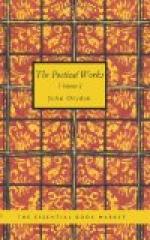XII.
Amidst the peaceful
triumphs of his reign,
What wonder if the kindly beams he shed
Revived the drooping Arts again;
If Science raised her head,
And soft Humanity, that from rebellion
fled!
Our isle, indeed, too fruitful was before;
But all uncultivated lay
Out of the solar walk and Heaven’s
highway;
With rank Geneva weeds run o’er,
And cockle, at the best, amidst the corn
it bore.
The royal husbandman appear’d,
And plough’d, and sow’d, and
till’d;
The thorns he rooted out, the rubbish
clear’d,
And bless’d the obedient field:
When straight a double harvest rose;
Such as the swarthy Indian mows;
Or happier climates near the line,
Or Paradise manured and dress’d
by hands divine.
XIII.
As when the new-born
Phoenix takes his way,
His rich paternal regions to survey,
Of airy choristers a numerous train
Attends his wondrous progress o’er
the plain;
So, rising from his father’s urn,
So glorious did our Charles return;
The officious Muses came along—
A gay harmonious quire, like angels ever
young:
The Muse that mourns him now, his happy
triumph sung,
Even they could thrive in his auspicious
reign;
And such a plenteous crop they bore
Of purest and well-winnow’d grain,
As Britain never knew before.
Though little was their hire, and light
their gain,
Yet somewhat to their share he threw;
Fed from his hand, they sung and flew,
Like birds of Paradise that lived on morning
dew.
Oh, never let their lays his name forget!
The pension of a prince’s praise
is great.
Live, then, thou great encourager of arts!
Live ever in our thankful hearts;
Live blest above, almost invoked below;
Live and receive this pious vow,
Our patron once, our guardian angel now!
Thou Fabius of a sinking state,
Who didst by wise delays divert our fate,
When faction like a tempest rose,
In death’s most hideous form,
Then art to rage thou didst oppose,
To weather-out the storm:
Not quitting thy supreme command,
Thou held’st the rudder with a steady
hand,
Till safely on the shore the bark did
land:
The bark that all our blessings brought,
Charged with thyself and James, a doubly
royal fraught.
XIV.
Oh, frail estate of
human things,
And slippery hopes below!
Now to our cost your emptiness we know,
For ’tis a lesson dearly bought,
Assurance here is never to be sought.
The best, and best beloved of kings,
And best deserving to be so,
When scarce he had escaped the fatal blow
Of faction and conspiracy,
Death did his promised hopes destroy:
He toil’d, he gain’d, but
lived not to enjoy.
What mists of Providence are these,
Through which we cannot see!




